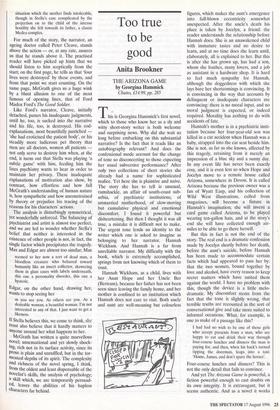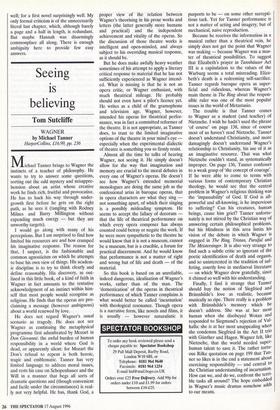Too true to be good
Anita Brookner
THE ARIZONA GAME by Georgina Hammick Chatto, £14.99, pp. 285
This is Georgina Hammick's first novel, which to those who know her as a sly and witty short-story writer is both welcome and surprising news. Why did she wait so long before embarking on this substantial narrative? Is the fact that it reads like an autobiography relevant? And does the confessional mode account for the change of tone so disconcerting to those expecting her usual subversive performance? After only two collections of short stories she already had a name for sophisticated malice. Yet here she is plaintive and naive. The story she has to tell is unusual, ramshackle, an affair of south-coast sub- urbia, of psychiatric institutions, of unmarried motherhood, of slow-moving but cumulative physical and emotional discomfort. I found it powerful but disheartening. But then I thought it was all true, a mistake it is difficult not to make. The urgent tone lends an identity to the writer which one is asked to imagine as belonging to her narrator, Hannah Wickham, And Hannah is a far from unreliable narrator. My difficulty with the book, which is extremely accomplished, springs from not knowing which of them to trust.
Hannah Wickham, as a child, lives with her Aunt Hope and her Uncle Ber (Bertram), because her father has not been seen since leaving the family home, and her mother is confined to an institution which Hannah does not care to visit. Both uncle and aunt are well-meaning but colourless figures, which makes the aunt's emergence into full-blown eccentricity somewhat unexpected. After the uncle's death his place is taken by Jocelyn, a friend: the reader understands the relationship before Hannah does. She is an unawakened child with immature tastes and no desire to learn, and at no time does she learn until, elaborately, all is explained to her. But this is after she has grown up, has had a son, whom she loathes, many lovers, and a job as assistant in a hardware shop. It is hard to feel much sympathy for Hannah, although the doggedness with which she lays bare her shortcomings is convincing. It is convincing in the way that accounts by delinquent or inadequate characters are convincing: there is no moral input, and no moral judgment is expected, or indeed required. Morality has nothing to do with accidents of fate.
Hannah's mother is in a psychiatric insti- tution because her four-year-old son was killed in a car accident when Hannah was a baby, strapped into the car seat beside him. She is not, as far as she knows, affected by this tragedy, retaining from it merely an impression of a blue sky and a sunny day. In any event life has never been exactly cosy, and it is even less so when Hope and Jocelyn move to a remote house called Arizona, somewhere in Devon. It is called Arizona because the previous owner was a fan of Wyatt Earp, and his collection of Wild West illustrations, culled from magazines, will become a fixture in Hannah's imagination; she will invent a card game called Arizona, to be played wearing ten-gallon hats, and at the story's end she will have collected enough air- miles to be able to go there herself.
But this in fact is not the end of the story. The real end is a dramatic confession made by Jocelyn shortly before her death, before the aunt's suicide, before Hannah has been made to accommodate certain facts which had appeared to pass her by: that the two women, bound together by love and alcohol, have every reason to keep secret matters which have united them against the world. I have no problem with this, though the device is a little melo- dramatic. My discomfort stems from the fact that the tone is slightly wrong, that terrible truths are recounted in the sort of conversational give and take more suited to informal occasions. What, for example, is one to make of a passage like this?
I had had no wish to be one of those girls who accept presents from a man, who are happy to eat and drink their way through four-course lunches and dinners the man is
' paying for, and then, when his back's turned tipping the doorman, leaps, into a taxi: 'Home, James, and don't spare the horses'.
Four-course lunches and dinners? This is not the only detail that fails to convince.
And yet The Arizona Game is powerful, a fiction powerful enough to cast doubts on its own integrity. It is extravagant, but it seems authentic. And as a novel it works
well; for a first novel surprisingly well. My only formal criticism is of the unnecessarily literal last chapter, which, although barely a page and a half in length, is redundant. But maybe Hannah was disarmingly commonplace all along. There is enough ambiguity here to provide few easy answers.



















































 Previous page
Previous page